#World Exposition
Explore tagged Tumblr posts
Text



Sanyo Healthy Capsule at Expo '70 in Osaka, Japan
#70s#1970s#design#tech#technology#retro#retro aesthetic#retro futurism#sanyo#expo '70#japan world exposition#healthy capsule#sanyo healthy capsule
5K notes
·
View notes
Text
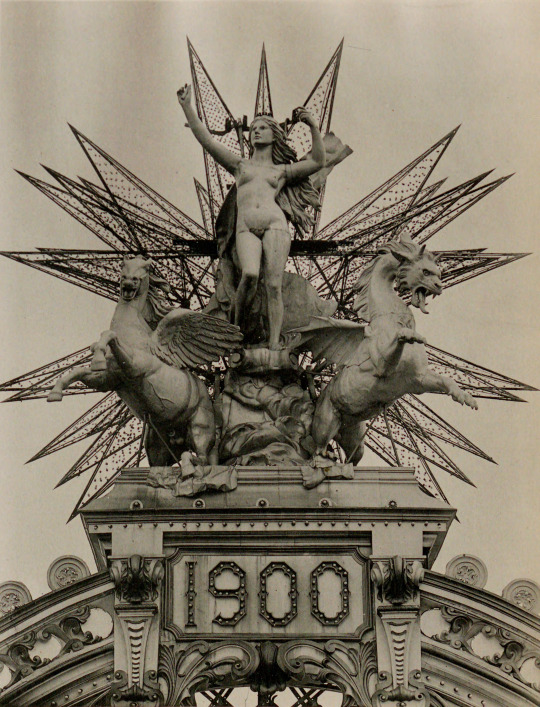
Palace of Electricity sculpture. L'Exposition Universelle de 1900 : détails de sculpture. 1900.
Internet Archive
#paris#1900#world's fair#exposition#architecture#sculpture#art#ornament#radiating#nemfrog#early 1900s#1k
4K notes
·
View notes
Text

A lot of this info we already knew from Enies Lobby, but Oda takes advantage of the fact that Luffy himself wasn't present from the initial exposition to repeat the information, while also deepening the reader's understanding of how these currents work
155 notes
·
View notes
Text
Why The Ending Sucks
Ok I figured it out. Hear me out:
The entire comic has a running theme best summed up as "who is controlling the narrative, and why are we listening to them?"
Hussie plays a caricaturized version of himself that he describes as "buffoonish" and "oafish". Caricature!Hussie is well-meaning, but a dumb idiot who's incredibly biased in favor of certain characters and in disfavor of others (the most obvious example being his "love" of Vriska, but there's also the way he constantly disparages Eridan). As a result, you have to be VERY SKEPTICAL and VERY CAREFUL when approaching Homestuck's narration, because even when the "best" narrator is at the helm, he's not 100% trustworthy and incapable of giving the readers an unbiased view of the story.
I say "best" because, importantly, Hussie isn't the story's only narrator. He and Doc Scratch explicitly fight over control of the story - Doc Scratch, the child abusing predator who engineered Alternia's fascist murder society, whose shaping of its history is explicitly described by character!Hussie as "fanfic". He is then killed by Lord English, who is described by Hussie as embodying the "toxically masculine" and by extension, the patriarchy, and Caliborn explicitly takes control of the story. John even grapples with Caliborn's version of events, calling out how sexist and misogynistic and shitty it is.
So if we're keeping score: control over the narrative is LITERALLY wrested away from Hussie (who was already struggling to be unbiased) by fascists, abusers, and the patriarchy. It's stressed multiple times that Caliborn/LE are responsible for literally everything that ever happens; the reason the Game Over timeline ends the way that it does is because the alpha timeline is, in essence, the narrative LE is telling: the forces of fascism get to claim the new universe, thereby propogating itself, while friendship dies and all hope is lost.
Who's in control of the narrative, and why are we listening to them?
There are other minor examples of this, too: Aranea is an exposition fairy, and she's biased as fuck and wrong ALL THE TIME about her own teammates. Karkat's explanations and rationalizations are constantly tinged with his own self-loathing and self-blame. Sollux and Meulin are both prophets as per their Mage class, but are both so bogged down by their own emotional issues that the futures they pick out are actively harmful. So on and so on. At nearly every turn, you have to interrogate who's telling the story, what their motivations are, and what they're overlooking or deliberately obfuscating.
So given that this theme is so prevalent, and so thoroughly weighted toward "well, actually, maybe you shouldn't take narration at face value and should interrogate it and come to your own conclusions," it would be Really Weird for the story to go "actually, you can totally trust the narrative now because everyone gets a happy ending".
So, I know that it makes me sound like a conspiracy theorist, but here's my genuine take on Homestuck's ending:
The ending is shitty on purpose because the viewer is intended to take it as a dare to refute the narration and make something better.
Why are we letting character!Hussie tell the story? He's a biased idiot. Why are we letting the various avatars of LE and Caliborn tell the story? They're fascist, misogynistic, predatory assholes.
And - because Homestuck is a story about life - why are we letting idiots, assholes, abusers, and creeps dictate the story of real life? The world is full of forces that would try to take control of the story and make everyone else play along, represented in microcosm within the text of Homestuck. We cannot let those forces win.
So please go out and do something kind and hopeful and loving in the world today. Thanks for reading.
#homestuck#homestuck lore#homestuck analysis#anyway i know that this sounds Crazy but hear me out#Hussie does not drop the act in the book commentaries#which were written after the comic ended#moreover the ending and epilogues are chock full of stuff that really seems designed to piss off as many people as possible#like vriska coming back but having her character development reverted#which upset both vriska haters AND vriska fans#and famously the existence of Yiffany which lowkey fucks up rosemary#but the baffling thing is that in spite of these 'lets make everyone unhappy' moves#we're still getting vital exposition about how the world works (ultimate selfhood) and characters outright saying things like#it confused me for the longest time but looking at this running theme it makes sense#the ending of homestuck is the ending picked out by terezi... who never finished her arc#it's why even though it's LITERALLY the ending she picked out for herself and her friends#shes still unable to be happy in it or feel 'fixed'#because she too is unreliable!!! she can't do it alone!!!!#and bringing back vriska eased her guilt but didnt solve her fundamental issues...#because homestuck kinda can't have a happy ending unless EVERYONE IS THERE
201 notes
·
View notes
Note
how did you start writing books that had themes? i’ve been writing since i was 7 years old and i’ve always wanted to write a whole book one day, but i don’t feel like i write with enough intention for any of my stories to keep my interest long enough to write a novel. i love building worlds and characters, and i often understand the themes that i want to explore in a given piece, but i always feel like worldbuilding gets in the way of actually writing a plot or having something to say, or that i’m too interested in stuff that doesn’t matter as opposed to actually telling a story. that or i feel like my stuff is too derivative.
So I did the same as you from a very early age, a lot of writing that was kind of directionless, lacking overarching structures. I don't want to say it was immature but in the way of kids playing imagination games, it just kinda.. went on and on with no resolution just pure interaction where any random thing could happen because it seemed like the next step. But for that kind of writing, "the next step" was based off the one directly previous to it. To make the jump to what you describe as books with themes, "the next step" can't be based off the one directly previous to it. "The next step" has to be the extension of every single previous step, including the very first, because the entire story is built from the ground up to be a single unified whole.
I think the jump from the directionless writing to writing A Novel (with all attendant structural conventions - different to fanfic, tv writing, screenplays etc) is that the novel is approached holistically with every single event considered at the same time, instead of each little part examined as a discrete unit that links to the next at the end of the chapter/scene/etc.
What I did was write my entire series out - all three books - in rough draft format, changing it and retconning it freely as I went. the continuity in these drafts sucked and the themes are all over the place but when I was finished with these three book drafts I had every tool at my disposal. at the end of my book 3 rough draft I had worked out all my themes and my events sequence etc. which meant that when I went on to start writing what would become the final draft of stbh (complete rewrites from the ground up, no reusing rough draft prose), I knew from the very beginning exactly how the story would end and it gave me so much freedom and space to approach the full story as a whole, add foreshadowing that wasn't there before, coded hints to how the last book would end (nobody's spotted them yet... as far as I know), and so on
As for themes vs worldbuilding, and what details matter more, ultimately it's for you to decide what you want to focus on. But you also need to understand when a particular element needs to be cut to serve the narrative. If it's something you really really need to include, then you need to restructure the narrative around it (the rough draft -> rewritten first draft method helps a lot with this). There's plenty of plotlines I really liked which I axed in the end because, cool as they were, they broke the causal chain and therefore had to go.
When choosing themes you can approach it not as "what do I like" but "what do I want to say". This should clarify a lot of things. Sometimes what you want to say is "wouldn't that be fucked up or what", it isn't always some deep commentary on the world. For the imimata story I went at it with the initial core of "I am talking about dehumanisation, abuse, and celebrity culture". So I have to wrap my worldbuilding around that, rather than start without direction. The fact that the situation for imimata is so dire is a result of this theme. And so on.
Finally for worldbuilding it is possible to overdo it. I personally get turned off a story very quickly if I'm hit with eighteen walls of exposition and detail unrelated to characters, because I only want one thing and it's disgusting (character interaction), so I'm happy with a very loose canon setting. Not everyone's the same. When you do reveal world building details, link them to your theme. Let's say in Inver my theme was poverty and I want to talk about my worldbuilding around diets. I narrate that through a character who grew up in poverty reminiscing about having to go collect whelks in the bay mud. That teaches us about the physical geography of the city, what the view out to sea looks like, the coastal habitats, the types of food gathered by the poor, and also something about that character as well. Additionally, you might know one billion facts and figures about your setting but do your characters have that knowledge?
Also your own interests vs others' - write for yourself first or you'll be miserable. And if it's derivative or not - idk I mean I just avoid pulling inspiration without twisting it into what I want (and I also avoid pulling inspiration from ppl on my tumblr dash because that's how things get stale). I am a contrary bitch first and foremost and I approach a lot of stuff like "everyone's doing this? well I'm doing the opposite" ... ymmv
#finally for me what helped was ditching the blank slate fish out of water protagonist#everything kinda clicked for writing books when i wrote about someone already entrenched in their world#with their own opinions and biases on this place. and then the worldbuilding doesn't have to be exposited#it can be observed#although i don't think stbh is the best ever example of that lol but it's better than my previous attempts
87 notes
·
View notes
Text
Ghoap god type AU.
Soap is the long forgotten god of death.
Ghost is his first follower in a very long time.
[this started as a humble text post and has snowballed into 60,000+ words]
Ao3 /// part 1 /// part 2 /// part 3 /// part 4 /// part 5 /// part 6 /// part 7 /// part 8 /// part 9 /// part 10 /// part 11 /// epilogue
————
At first, Soap had been seen as kind and benevolent. The one to end someone’s suffering and help them along to the afterlife. However, as more wars began to break out, his perception changed into that of a bloodthirsty warmonger. The type that you sacrifice the blood of innocents to for luck in your upcoming battles.
Soap had simply ignored the brutish offerings. But then they spread. Like a plague, soon everyone was murdering their chosen victims in his temples in the hopes that it would bring them even more fortune.
Realizing that his presence was just causing more and more to die, he let himself fade away. He was reduced to nothing more than a comforting feeling people felt before they died. Over time, the so-called offerings stopped. Scared of what would happen should he return, he continued to fade.
A god is only as strong as their followers believe them to be. With no followers, no offerings, they are nothing. While mortal weaponry may hurt a god, may even get them to bleed, it cannot kill them. A god can only truly die when they are no longer remembered.
Soap is waiting for the day that he is truly forgotten and can pass on when he gets a feeling. One he has not had in an age. Though his worshippers have abandoned him, his temples and statues remained, though now significantly worse for wear. And someone just provided an offering of a single slice of bread on one of his statues.
A meager offering, sure, but it’s enough to get his attention. He has almost no power nor any energy left, but he sees a soldier sitting next to the statue as he ate his meal.
Meanwhile, Ghost hadn’t the faintest clue what god he just gave an offering to, but he felt a little better afterwards and so just hoped they weren’t evil. He took note of the statue’s appearance and when his troop was encamped near a town, he snuck away to a local library to see if there were any books he could find about it.
He was not apart of the army willingly, but he owed them a life debt and they had decided that it would only be repaid upon his death. Just a glorified prisoner, he was kept at the general’s side as his favorite weapon. Sneaking away was difficult, but definitely doable. The few times he was caught, he made enough of a disturbance that it was easier for everyone involved to let him do his thing.
They did not need to worry about him running away. If he was able, he’d have run the second he was given the chance. However, he was stuck. As long as he owed a debt, he could not leave.
The statue, at the very least, gave him something to do.
He was intrigued. He did not recognize the features at all, and his research confirmed that it was not a well known deity. It takes a long time of asking the right people and finding the right books to uncover the story of the forgotten god.
Having read everything — from loving poems about the being helping sickly children find comfort in their last moments to angry anecdotes about desperate townspeople sacrificing themselves in the hope that the god would show them mercy — he decides to give the god the benefit of the doubt.
He figures the world is shitty enough, why not find some good that had been tucked away? Ghost himself was seen more as a weapon than a person and couldn’t help but sympathize. He was never one for gods or worship, more likely to curse the heavens than ever sacrifice something of his, but he almost felt bad for the being. So, the next day, from one bloodthirsty monster to another, he gives the forgotten god more offerings.
It’s still not much, just an apple and a ring the general wouldn’t notice missing, but he sets them there anyways. He damn near jumps out of his fucking skin when the feeling of an accepted offering floods through him. He stares at what would have originally been the face of the statue, but nothing happens. The trees behind him continue to sing their song in the faint breeze, with the sounds of a lively woods never fading.
There is no outside sound, no out of place movement, no indication that he hadn’t just imagined the feeling. A leaf falling from one of the branches and landing on the pedestal, where the offerings were now gone, snapped him out of his staring contest. He muttered out a gruff thanks and sat down to eat, ignoring the feeling of being watched.
#i have more ideas but this is more than long enough#i am very asleep sorry for any mistakes#ghostsoap#soapghost#ghoap#if the soldier plot line seems rushed and undeveloped#that’s because it is lmao#sorry this post about ghoap turned into me exposition dumping about a world that doesn’t exist#forgotten death au
322 notes
·
View notes
Text
on scavengers and the cycle (part 2)


...or, why it's still not a good idea to die in a world where death is meaningless!
(Part 1)
i've talked about this before, but for my AU stuff, i personally like to interpret the cycle as being a respawn for creatures that die: it's a spiritual take on getting a game over and restarting. it's not clear how it works, but the individual comes back intact, waking up in the last shelter or den they hibernated in.
(given that the game’s symbolism is inspired by buddhism, it’s most likely that the rain world cycle revolves around continuous death and rebirth; dialogue in the watcher DLC pretty much confirms this. however, like a lot of things about the game, i think it’s also deliberately left open to interpretation!
i like both concepts for the cycle pretty much equally, but i use the respawn concept for my AU stuff because it’s particularly unique compared to other settings.)
the scavengers are blasé about death regardless of which interpretation of the cycle you use, but this explanation makes a little more sense for anything involving respawning/resurrection.
most creatures are too wrapped up in their survival instincts, and therefore avoid dying as much as possible.
and once again, for slugcats, it varies between individuals... but with their nomadic natures and tight-knit family units, losing someone can have devastating consequences.
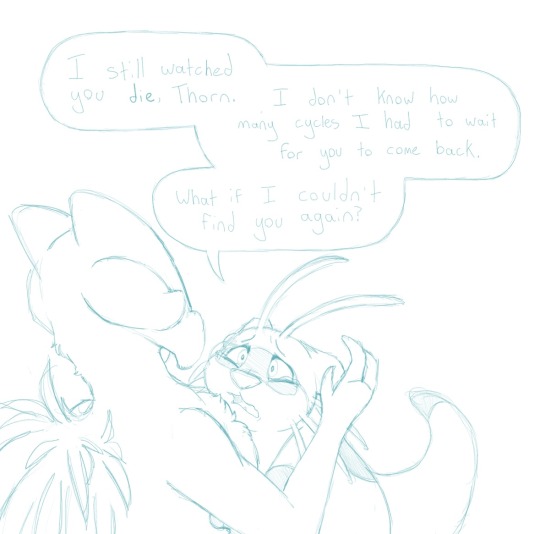

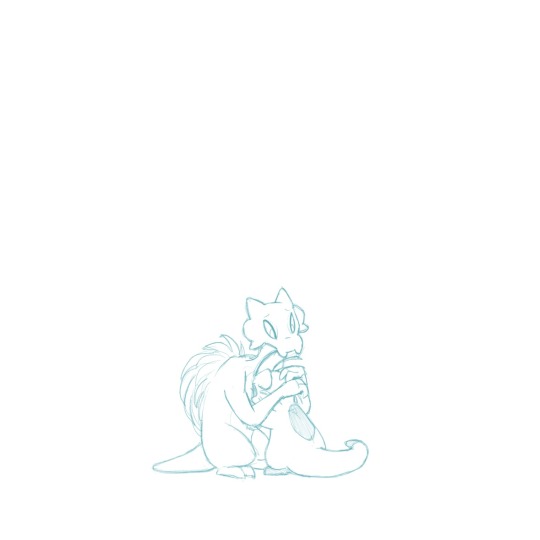

it's no wonder so many of them choose ascension in the end.
#kibble scribbles#rain world#rw slugcat#slugcat oc#rw scavenger#scavenger oc#cw death mention#long post#did i write out all this exposition just to add context to my OCs hugging?#absolutely i did#lex slugcat#thorn scavenger
34 notes
·
View notes
Note
Me watching my Inquisitor walk off with Solas at the end of the game like :) "aw cute ..hey if Mythal hadn't told you to stop would you have murdered her,," (I haven't played the other endings yet).
This!!!
(Obviously, not murdered her personally, but he absolutely had no qualms about doing the ritual once more - knowing the consequences of it.)
Let me preempt this by saying that I wanted there to be a happy/fulfilling ending to Solas and Lavellan. I'm not a blind hater! Just someone who finds it very hard to put my own Lavellan in the place of the 'Lavellan' provided to us in DATV.
The Solas/Lavellan relationship already was kind of iffy (power imbalance, constantly dragging her culture, removing her vallaslin/then dumping her, constantly lying to her, etc...) but DAI did a great job of making you feel sympathetic towards his plight - especially after Trespasser! He woke up in a world so divorced from his own that it was unrecognizable - the people he had done so much for were suffering from the consequences of his actions, justified as they may have been at the time (stopping the evanuris). His actions led to great suffering in the pursuit of preventing even greater suffering.
Even after we learned of his plans in Trespasser, it was very much: "cool motive, still murder."
I felt sympathetic towards Solas and the implication that we could change his mind, given to us in Trespasser, gave me hope that we would be able to convince him of another path. That he could find a place in Thedas as it is now and look to the future. That was why I chose the option to try and get through to Solas, despite knowing that his plan would lead to mass death/terror if it went ahead.
I always expected the Veil to fall at some point, but i was hoping there'd be some more nuance to it than: veil gone, demons everywhere, lots of people die. Well, I was very wrong lmao.
But, if anything, the game made me entirely unsympathetic towards Solas.
The moment he started his ritual he chose the old elven empire over Lavellan - over her family, friends, home, culture, and anything else she may have loved/valued.
And he did this twice.
He chose to pursue lowering the Veil - knowing that thousands would likely die. For all his insistence of 'minimizing the damage' he went in knowing that many more people would die because of his actions. There was no justification of stopping the evanuris this time either - no excuse of not knowing the potential consequences of his actions like the first time.
He chose to begin the ritual that ended up releasing the Elven Gods - knowing full well the risks it entailed.
He killed Varric - whether by accident or not, it was by his hand.
He chose to use blood magic to manipulate Rook into thinking that Varric was alive - puppeting his corpse around in Rook's eyes and putting his words into Varric's mouth.
He chose to manipulate, mold, and guilt Rook into the old 'switcheroo' in his mind palace/regret prison
He chose to 'free' the elven people by bringing down the Veil - regardless of their feelings about it (elven Rook can call him out on this!), never mind the consequences or ramifications of a bunch of people suddenly having their bodily autonomy overwritten by now being magic/having immortality.
He looked at the devastation caused the by the Gods and still went ahead with trying to bring down the veil again.
These are the thing he does in-game - not even mentioning making the dwarves/titans tranquil, creating the blight, started the chain of events that led to SOUTHERN THEDAS BEING DESTROYED, and taking my good gear from Inquisition!
Aside from the 'all lore leads to Solas' reveal just being really dull it also does nothing to help with making me sympathetic to him as a character. The audacity of this man to say: "it was like walking in a world of tranquil" when he fucking lobotomized the dwarves/titans is wild in retrospect.
If he didn't do the ritual at the beginning, if something else went wrong and that resulted in the God's being released, I could understand why a Lavellan would still want to get through to him. It would make sense - she could stop him from doing it again at the end too! You can still have him conflicted and torn between the restoring the past or pursuing the future - but this doesn't happen!
He never chose Lavellan in this game! Hell, it's Mythal who convinces him to stop?!! He owes her nothing! He's learned nothing from this!!! He's only stopped because Mythal 'pardoned/freed' him - once again showing that he values the ancient elves/mythal over her!!!
How impactful would it have been to have him choose Lavellan over Mythal! To show us this! Mythal, who 'crawled through the ages for a reckoning' (which was retconned to her being sad about the elves lmao) telling Solas to go through with the ritual and him touching grass and saying 'no'.
It's something I feel was wildly out of character for him as well - he never came across in DAI as being subservient to Mythal, if anything the ending cutscene gave me the impression they were equals?!
After everything he did in this game - after all we learn about what he did in the past - I had no interest in reasoning/appealing with his ass. None whatsoever. My inquisitor/Lavellan asking if Solas can be reasoned with only made me regret making that choice - perhaps other people's inquisitor's would say that, but mine would not, especially after everything that happened in game.
She came across as delusional: standing on the ruins of a blighted Minrathous, the south blighted to hell, dead all around them, blight tentacles everywhere, a gaping hole in the Fade right next to them:
Lavellan: "I forgive you! All you have to do is stop." Solas: "But I cannot."
Boom! There it is.
At this point it's not romantic, it's just sad! Sad that she's spent 10 years pining after a man who seemed to learn nothing at all from what happened in DAI.
------------------------
There should have been some sort of a dialogue option with Lavellan right before you go into the big fight - she can ask you what you think of Solas, if he's truly regretful for everything that happened, and then you can give her an answer that can 'change' her approach to Solas in the end - giving the player some agency as to how their Inquisitor would actually respond to this.
Ending One: Bye Bye Bye
Rook: "HE'S A GUY."
alternatively, "Look around you! Look at what Solas has done - what he's threatening to do even now after all of this! You gave him every chance to turn away from this path. So did Varric...and look at what he did!"
Lavellan is bitter/angry with Solas: "It seems we never were people to you after all."
Refers to him as 'Fen'harel' and not Solas - dig the knife in deeper, give us angst!
"Just go. You love the Fade, don't you? Enough to do all this - enough to kill Varric for your pride in a dead world that no longer exists. We were never 'real' to you, were we?"
Solas says his goodbyes, expresses his love, and Lavellan steps back.
Solas leaves voluntarily, his 'situation-ship very much over', to stew in his regrets for the rest of his life.
Ending Two: Bittersweet Goodbye
Rook: "Girl, it's been 10 years."
alternatively, "You loved him once, perhaps you still do even now - after all he's done - but love wasn't enough. Love does not excuse this."
Lavellan is firm with Solas, does not excuse his actions, but has a bitter sweet farewell: "I had hoped…it doesn't matter what I hoped. You made your choice - it wasn't me. It wasn't our friends. It wasn't this world. You can make a choice now - if I ever mattered you. If I, if our friends, were ever real to you."
They can have a final goodbye, a goodbye smooch, and then he can go off to the Fade.
Bittersweet ending - acknowledge what they had and then provide closure.
Ending Three: Happy Ending (?)
Rook: "He didn't mean it babe. He's tots sorry."
alternatively, "He seems to regret what's happened - I've seen his memories, his regrets. He believes this is the only path he has. Perhaps you can convince him to find another."
Default Lavellan ending basically
"There is no fate but the love we share" blah blah blah
As happy an ending as it can be when you have Lavellan fuck off to the Fade - leaving behind her life, friends, family, and whatever remains of the world for an eternity.
I'm being mean but I genuinely wanted a happy/fulfilling ending for them both too - despite the fact that this game seems to want that ending as well, it did little to convince me of that. :(
I genuinely liked Solas in DAI - despite his flaws, I thought his romance was compelling and I was hoping to be able to convince him to change/alter his path. I can see what they were trying to do with him in DATV but it's so hard to feel sympathy for him when we see/know the results of his actions. The story in this game is doing anything but convincing me to give him a 'happy ending'.
'Love' can't excuse what he did and neither would my Lavellan.
Also RIP Sandal's Prophecy about the Fade lmao
#super compelling character#stuck in a very uncompelling story#if you're happy with the ending I'm glad! my Lavellan would have kicked his ass though#hard to feel sorry for a guy who ends up inadvertently nuking the world while planning to do a ritual that will kill thousands#Oops I accidentally pressed the nuclear missile codes instead of the regular missile codes my mistake tee hee#i would have LOVED the chance to try and change his mind btw - I WANTED TO SAVE HIM#Gareth David-Lloyd was the highlight of this game#which makes this all the more depressing#delivered the performance of a lifetime for this trainwreck of a romance ending#DAI Solas is superior change my mind#wasn't reduced to an exposition machine either#my cat stepped on my laptop while writing the post - i copied and pasted his message to u all:#uyyyyyyyyyyyyyyyy126qw12qw12qw12qw12qw12qw12qw12qw12qw12qw12qw12qw12qw12qw12qw12qw12qw12qw5rtt#words of wisdom#datv spoilers#datv critical#bioware critical#dragon age the veilguard#solavellan critical#veilguard critical
116 notes
·
View notes
Text
There’s a ton of advice out there in how to avoid exposition dumps, but I think a super under-rated reason for withholding information and justifying “why didn’t you say this earlier” is with a self-deprecating narrator who doesn’t think anyone cares.
I have one, and he never breaks the fourth wall or anything, but basic elements of his backstory aren’t being revealed until the final chapters of the second book, things like, hey, how come we’ve never heard about Elias’s father?
And he just did not think that it was something anyone wanted to hear, so he said nothing, but also he comes from an insulated place where this is the norm, so why point out that the sky is blue to the audience?
The point of giving this information so late isn’t for the sake of informing, it’s to make the reader go “hey wait we’re just hearing about this now???” You’re supposed to think it’s weird and jarring.
31 notes
·
View notes
Note
If you're still taking requests, can you draw Tsukumo? :D

he won a harrowing ebay battle
#my art#ask#yakuza#ryu ga gotoku#rgg#龍が如く#judgment#judge eyes#tsukumo is so cute i like him more than a lot of the other Exposition Info Dump characters#worlds first ethical incel and whatnot
88 notes
·
View notes
Text
I can't believe this one sardonic line from 1x10 explained Matt's abilities more than 9 episodes of Born Again.

#Marvel#Daredevil#Born Again#Daredevil Born Again#Matt Murdock#They did finally say in 1x05 that he was an orphan growing up but that's as much as we got#BA is so non-serious#They really pitched it for new and returning fans#while saying “Yeah he just does that‚ and by 'that' I mean [footage not found]”#No BA is not an origin story. I know#Yes we already established all of this in DD#But don't pretend it's an entry point for new fans‚ is what I'm saying#I understand that no one new in his life knew about DD for him to explain#although Cherry might have been a good one#I personally think a good way to bring it up might have been Fisk letting slip in the diner scene how much the not knowing has bothered him#There's no way it hasn't eaten at Fisk for years how Matt is DD#Think about how confused and frustrated he is watching the prison footage in 3x05#In the comics he has a file on Matt's accident as a result of all his stalking#Just let him have a line in the first episode like “It's because of your accident as a child‚ isn't it?”#He can say a little more about it for the audience's sake while Matt's mind flashes back to sounds of that day#It's that simple and organic to slide in exposition#WHILE making a little more sense in 1x08 as to HOW Fisk knows Matt can hear so well when he whispers#I also feel it would have been a good time to abandon “world on fire” and introduce Matt's radar sense#which would have played veeeeery nice in 1x08 with Dex's shooting#But as I said... BA is very non-serious
37 notes
·
View notes
Text
@soulgathered
Considering the way Loop's wish was granted, Siffrin couldn't exactly say he was surprised at how this one turned out. He honestly wasn't even sure if this one was possible - he didn't know what actually happened to Loop when they disappeared, after all.
But . . . Loop should get their happy ending, too. Perhaps, maybe, the Universe would be willing to make up for what it had done to them.
It took Siffrin a while to actually make the wish, after their experiences with their previous one, and the results of it was a possibility they figured could happen, but, if this was possible, and Loop returned home after helping, then Siffrin probably would, too. It'd be fine, wouldn't it? It'd hardly take long, already knowing how to break them.
. . . Unless Loop decided to be really difficult about not talking to their family.
He couldn't exactly say it was pleasant to be back in Dormont, though, even if it wasn't his own. He'd be fine. He'd be fine. It wasn't his loops to be stuck in this time. He wouldn't have to go through the House all over again. He could act for Loop as Loop acted for him.
Actually . . . didn't they say once, that if they were in Siffrin's position, they'd spend all their time in the House? Would he even be able to find them in the meadow? Would they even come to the Favor Tree? Or would helping Siffrin with his own loops change the way they acted with theirs?
They didn't know. But they knew two things: they had to find Loop, and, unless Loop gave them the okay, they could not let their - Loop's? - family see that there were two Siffrins. The Universe didn't change their body this time, after all, and that would be a lot to explain.
Hm. Siffrin looked at his hand. The easiest way to find Loop without letting the others see him would probably be . . .
He closed his first and extended his thumb and pinkie, then brought them to his face as he thought hard about talking to Loop.
". . . Loop?"
#The World's Greatest Actor (Siffrin)#v: free at last#(. . . even if they've now put themself in loop's loops)#(THE ISAT CURSE KEEPS STRIKING ME <- was just working on a fanfic so they defaulted to second person)#(my rp replies are NOT supposed to be in second person)#(hi I like exposition you don't have to match the length of the starter)#(loop minding their own business in their own universe when suddenly they get a call from stardust)#soulgathered
29 notes
·
View notes
Text
did anyone else know The Last Unicorn had a sequel??? i didn't know that
anyway, i want whatever tf molly grue and shmendrick have going on
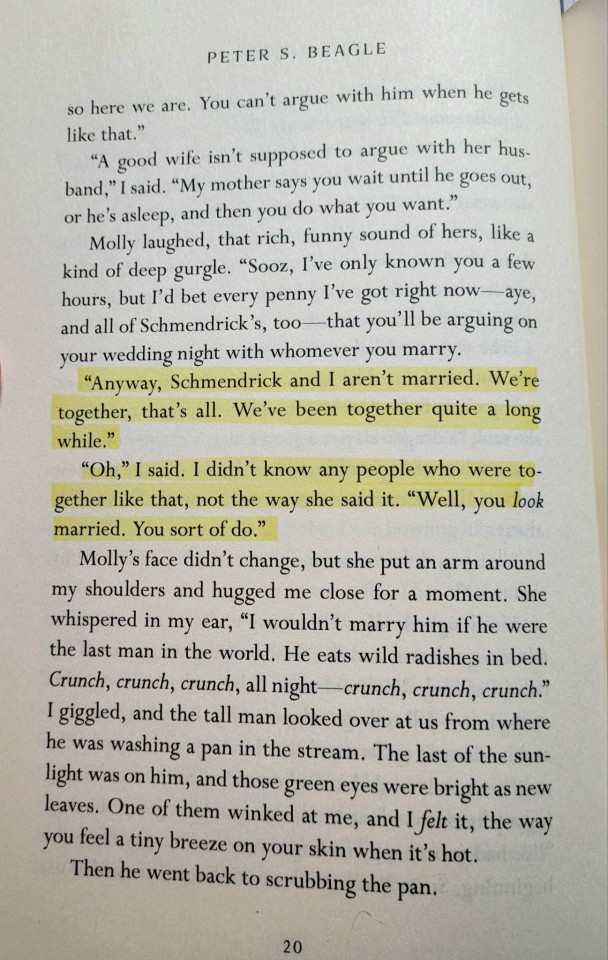
#not wc#(i think this may be implying they just never got officially married in a legal sense but i still like the potential vagueness)#sry this book doesnt rly count as xenofiction#but im p sure the last unicorn does since most of it is her pov#shhh its fine#the last unicorn#the way home#<- title of the book if u want to know#i bought this at random bc i like the authors writing style#i had no idea it was in the last unicorn world until They showed up#good for them. whatever they're doing.#this narrator is a little kid who wanted to go personally yell at the king#and then molly and shmen found her wandering aimlessly around the woods so theyre like#oh word sure we'll take you to the king weird child#we know that guy hes just having a bit of a depression episode ever since his gf turned into a unicorn and fucked off forever#this book does the opposite of warrior cats where everytime the kid tries to get them to give her exposition about what happened-#-in the previous story they just refuse to answer#'what do u mean there was a different castle that fell into the ocean what happened with that--'#'dont worry about it kid its completely irrelevant'
31 notes
·
View notes
Text
i've been consistently and gradually ageing verity up the past few years to the point where she's in her early 20s rn but. ngl i either want to age her down or age finnian and neoma up because verity/neoma is kinda scratching an itch in my brain rn
#bwark#ttb#much to consider#i just have a scene in mind where neoma lays a lot of exposition about the world to verity and in this scene verity ''comes clean'' about#''lying'' about her gender. and neoma is just like ?????? what the fuck are you talking about#and then she explains how your aura affects how others perceive you and its very malleable to your current identity#so you like you can wake up on day as a guy and then the next as a girl and everyone would just be like okay no biggie#so it's basically neoma explaining that if verity wants to be a girl then she can just be a girl#this is a trans girl explaining this to another trains girl and it's such a pivotal moment for verity and a form of support she really#needed. meanwhile finnian has so much healing and self love to do before he's ready for any sort of relationship#maybe neoma unintentionally projects an idealized version of finnian onto him and that really doesn't help with his feelings of inadequacy#and neoma could have a moment of learning to not white knight him and she realizes that it wouldn't work out necause while they do become#good friends the romantic element just. is not there#you can always improve your oc story by adding more yuri
17 notes
·
View notes
Text
"Seven years ago we all went through the flames; and the happiness of some of us since then is, we think, well worth the pain we endured."
Although Dracula was published in 1897, some think that it takes place in 1893 because of the way the days and dates used line up. If that's the case, Jonathan Harker's epilogue, seven years later, would have been added around 1900. A new era bubbling with new change and new conventions. The story ends with Jonathan looking ahead to a new century filled with the unknown and being able to look on the past, despite its darkness, "without despair."
#dracula#dracula daily#November 7#thanks to anon who mentioned 'new woman' term didn't get officially coined until 1894#but at the same time certain technology mentioned in the book didn't get its stride until the early 1890s#by publication it ends near the end of the century either way#but ending exactly on 1900 would be an extra nice touch#Jonathan harker#mina harker#1893 was also the year that electricity was displayed on a large scale for the first time at the Colombian Exposition in Chicago#also known as the “World's Fair”#bram stoker#quincey morris#jack seward#abraham van helsing#arthur godalming#the emphasis on modern methods and technology and unconventional characters throughout and then ending with the beginning of a new era#dracula analysis#dracula thoughts#one of those things where you wonder if it was intentional or just worked out really well#twilight-zoned-out#did not keep up with drac daily very well this year#but congratulations to those who did
274 notes
·
View notes
Text
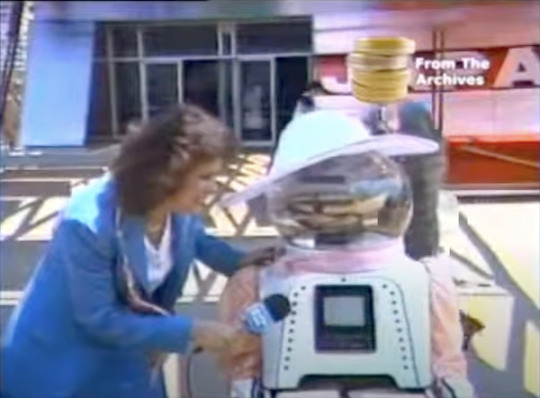

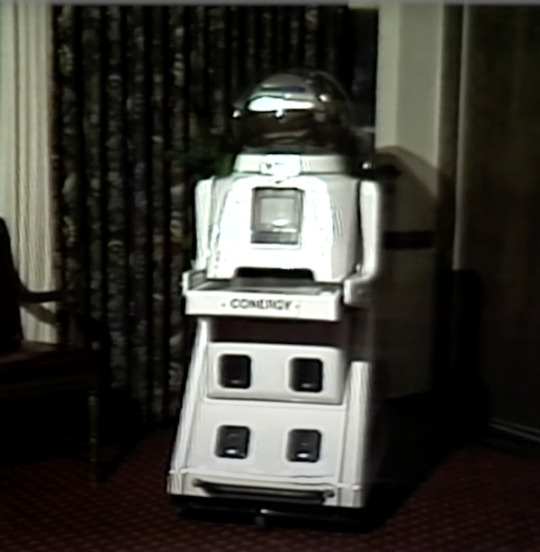
youtube
"Connie" Conergy (an Android Amusements DC-2), The Conergy Energy Saving House, 1982 World’s Fair, Knoxville, TN. "Hi I'm Connie, I'm your robot from Conergy and I'm here to invite you to join us at the energy saving house at the 1982 World's Fair. We'll be there to tell you about all sorts of ways that you can save energy on residential housing. From household conservation, cooling, ventilation, heating, plumbing, and insulation. And we have all sorts of interesting characters that I'm looking forward to introducing to you when you come visit us at the fair. So please come join us. We'll be at the 1982 world's fair located across the street from the Japanese pavilion and next to the candy factory. Come see us." – Join CONNY and her friends at the Conergy Energy Saving House.
#cybernetics#robot#showbot#1982#World's Fair Knoxville#Knoxville International Energy Exposition#Youtube
41 notes
·
View notes